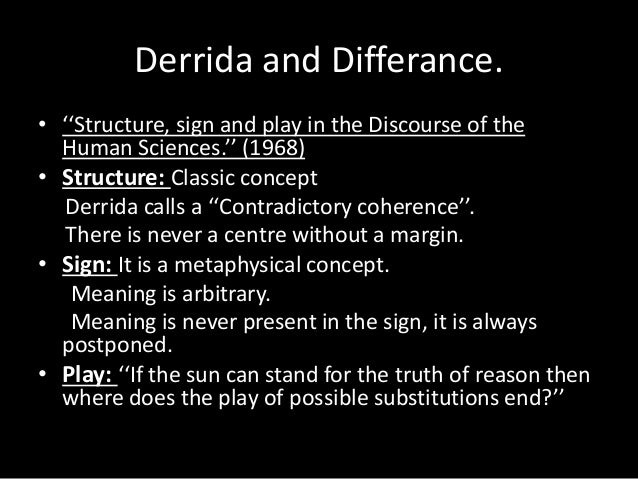Deconstruction By Jacques Derrida
Introduction :-
Jacques Derrida
was an Algerian-born French philosopher, known as the founder of
deconstruction. His voluminous work has had a profound impact upon
literary theory and continental philosophy. His best known work is Of
Grammatology. Distancing himself from the various philosophical
movements and traditions that preceded him on the French intellectual
scene (phenomenology, existentialism, and structuralism); in the mid
1960s he developed a strategy called deconstruction.
Derrida was one
of the most widely revered and widely reviled thinkers of the
mid-to-late twentieth Century.
Key concept of the Derrida's Deconstructions:
Deconstruction:
Deconstruction
is a school of philosophy and literary criticism forged in the
writings of the French philosopher Jacques Derrida. Deconstruction
can perhaps best be described as a theory of reading which aims to
undermine the logic of opposition within Texts. For Derrida this
requires a scrutiny of the essential distinctions and conceptual
orderings which have been constructed by the dominant tradition of
Western philosophy
Differance
Differance is a
French word coined by the French philosopher and deconstructionist,
Jacques Derrida. The word is a play on several other words that
illustrate Derrida’s meaning. The concept of differance is a
complex theory that tries to illuminate the way words are used and
how their specific meaning is derived. Derrida called difference a
"neographism," meaning a term that is neither a word nor a
concept and is used to describe a literary idea.
In his theory of
deconstruction, Derrida claimed that because each person has
different moods, backgrounds, and ways of experiencing things, a word
or choice of words will not conjure up the same idea to every person.
‘’….in
language there are only differences without positive terms’’
This idea leads him
the two key concepts 1) Sign 2) Structure.
Binary Oppositions
The binary
opposition is the structuralist idea that acknowledges the human
tendency to think in terms of opposition. For Saussure the binary
opposition was the “means by which the units of language have value
or meaning; each unit is defined against what it is not.” With this
categorization, terms and concepts tend to be associated with a
positive or negative.
For example,
Reason/Passion, Man/Woman, Inside/Outside, Presence/Absence,
Speech/Writing, etc. Derrida argued that these oppositions were
arbitrary and inherently unstable.
The structures
themselves begin to overlap and clash and ultimately these structures
of the text dismantle themselves from within the text. In this sense
deconstruction is regarded as a forum of anti-structuralism.
Deconstruction rejects most of the assumptions of structuralism and
more vehementaly “binary opposition” on the grounds that such
oppositions always previlege one term over the other, that is,
signified over the signifier

No comments:
Post a Comment